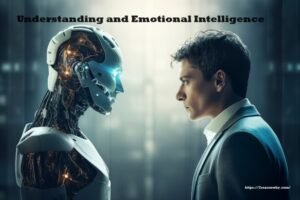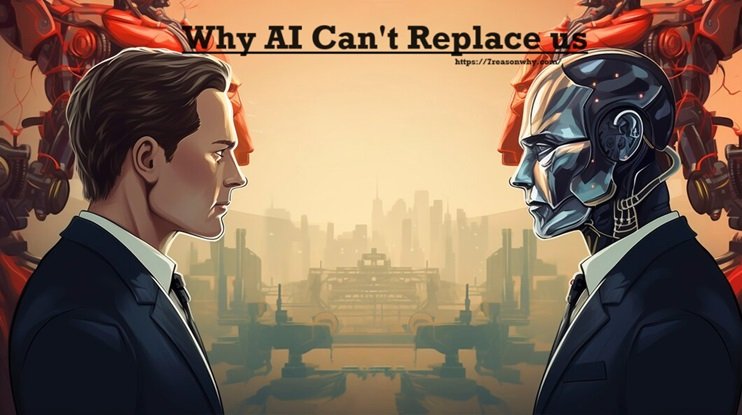Artificial Intelligence (AI) has emerged as a transformative force across various industries, from healthcare and finance to entertainment and transportation. With advancements in machine learning, natural language processing, and robotics, AI systems are capable of performing complex tasks and making decisions with unprecedented speed and accuracy. However, despite these advancements, there are fundamental aspects of human intelligence and capability that AI struggles to replicate. In this article, we delve into Why Why AI Can’t Replace us: 7 Reason Why in critical roles and why human ingenuity remains irreplaceable.
Why AI Can’t Replace us: 7 Reason Why
1. Lack of Genuine Creativity and Innovation
Creativity and innovation are hallmarks of human intelligence, rooted in the ability to generate novel ideas, solutions, and artistic expressions. While AI can generate content, compose music, or create art based on extensive datasets and patterns, it lacks the capacity for genuine creativity. Human creativity often arises from a combination of complex cognitive processes, personal experiences, emotions, and cultural influences that are challenging to replicate artificially.
For example, AI-generated art may mimic artistic styles or compositions based on historical data, but it lacks the emotional depth, intentionality, and personal expression that characterize human-created artworks. Similarly, AI algorithms can produce music that sounds pleasing and follows established patterns, but they cannot capture the raw emotion, improvisation, and inspiration that musicians bring to their compositions.
2. Understanding and Emotional Intelligence

Human communication and interaction are inherently nuanced, involving not just the exchange of information but also understanding contextual cues, interpreting emotions, and adapting responses accordingly. While AI excels at processing vast amounts of data and performing calculations, it struggles with understanding subtle nuances in language, tone, and non-verbal communication.
Contextual understanding requires empathy, cultural awareness, and emotional intelligence. Qualities that are deeply ingrained in human cognition and social interaction. For instance, in customer service roles, humans excel at empathizing with customers’ concerns, addressing complex inquiries, and resolving issues with sensitivity and understanding. AI-driven chatbots may provide scripted responses based on predefined algorithms, but they cannot genuinely empathize or tailor responses to individual emotional states and needs.
3. Ethical and Moral Decision-Making
Ethical decision-making involves weighing competing interests, considering consequences, and applying moral principles in diverse contexts. While AI can analyze data and recommend actions based on programmed algorithms, it lacks the capacity for nuanced ethical judgment and moral reasoning.
Human ethical reasoning is shaped by cultural norms, societal values, legal frameworks, and individual beliefs. Factors that evolve over time and vary across different cultures and contexts. For example, in healthcare, ethical dilemmas often arise when balancing patient autonomy, beneficence, and justice complex considerations that require careful deliberation and ethical sensitivity.
AI-driven systems may optimize resource allocation or treatment protocols based on statistical analysis, but they cannot navigate the ethical complexities of informed consent, privacy rights, or end-of-life care decisions in the same way that healthcare professionals do. Human judgment involves weighing qualitative factors, anticipating unintended consequences, and making decisions guided by principles of fairness, compassion, and respect for human dignity.
4. Adaptability and Learning from Ambiguity
Humans possess a remarkable capacity for adaptation and learning in response to ambiguous or uncertain situations. We can make decisions based on incomplete information, draw connections across diverse domains, and synthesize insights from disparate sources. A cognitive flexibility that enables us to navigate unpredictable environments and innovate in response to changing circumstances.
AI systems typically require large volumes of labeled data and structured inputs to learn effectively. They excel in tasks where patterns are well-defined and outcomes are predictable but struggle in environments characterized by ambiguity, uncertainty, or unforeseen events. For example, in strategic decision-making or crisis management, humans draw upon experience, intuition, and pattern recognition to make informed judgments and take decisive action under pressure.
5. Complex Interpersonal Relationships

Interpersonal relationships are central to human experience, involving empathy, trust, reciprocity, and mutual understanding. While AI-driven technologies can simulate conversations, provide customer support, or facilitate social interactions, they cannot replicate the depth and complexity of human relationships.
Building and maintaining relationships require emotional engagement, active listening, and the ability to perceive and respond to non-verbal cues. A level of social intelligence that emerges from our evolutionary history and socialization processes. For instance, in counseling or therapy settings, human therapists establish rapport, empathize with clients’ experiences, and tailor interventions based on individual needs and preferences.
While AI-driven chatbots or virtual assistants may simulate conversation patterns and respond to predefined queries, they lack the empathy, intuition, and interpersonal skills that underpin meaningful human interactions. Humans possess a capacity for empathy that enables us to connect emotionally with others, recognize their perspectives, and adapt our communication styles accordingly qualities. That are essential for fostering trust, collaboration, and mutual support in personal and professional relationships.
6. Intuition and Gut Feeling
Intuition often described as a gut feeling or hunch is a form of rapid cognition. That enables humans to make quick decisions based on subconscious processing of information and pattern recognition. While intuition can be difficult to articulate or rationalize, it plays a crucial role in decision-making, particularly in situations where time is limited, information is incomplete, or outcomes are uncertain.
Human intuition arises from experience, expertise, and tacit knowledge acquired over time, enabling individuals to draw upon past experiences, recognize patterns, and anticipate future trends or events. For example, seasoned professionals in fields such as healthcare, law enforcement, or finance often rely on intuition to assess risks, identify anomalies, or detect subtle cues that may elude explicit analysis.
AI systems rely on algorithms and statistical models to analyze data and generate predictions based on patterns identified in training datasets. While AI can process vast amounts of information and optimize decision-making in well-defined tasks. It lacks the intuitive insights and contextual understanding that humans derive from lived experience and tacit knowledge.
7. Human Oversight and Accountability
AI systems are developed, programmed, and controlled by humans, which introduces biases, errors, and limitations inherent in their design and implementation. Moreover, AI algorithms can produce unexpected outcomes or errors that require human oversight, intervention, and accountability.
Humans are ultimately responsible for ensuring the ethical use of AI, interpreting results in context, and addressing unintended consequences. A critical aspect of governance and accountability that cannot be delegated solely to machines. For example, in autonomous systems or AI-driven decision-making, human oversight is essential to mitigate risks, uphold ethical standards, and safeguard against potential harm or misuse of AI technologies.
Conclusion
While AI continues to advance and augment human capabilities across various domains, it remains a tool developed and controlled by humans. Its capabilities in data processing, pattern recognition, and automation are impressive, but they are not synonymous with human intelligence, creativity, emotional depth, and ethical judgment.
The future lies not in AI replacing humans but in leveraging AI to augment human capabilities, enhance decision-making, and address complex challenges collaboratively. By recognizing and harnessing the unique strengths of both AI and human intelligence, we can unlock the full potential of technological innovation while preserving the irreplaceable qualities of human thought, creativity, and compassion.
Note:
This expanded article explores in-depth Why AI Can’t Replace us: 7 Reason Why across various dimensions of intelligence and capability. It underscores the importance of human creativity, emotional intelligence, ethical judgment, and adaptability in complementing AI’s technological advancements. If you have further questions or need additional information on any specific aspect, feel free to ask!



